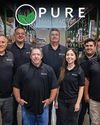The Challenges Of Building An Ethical Machine
Inc.
|November 2018
Academics worry how A.I. will be programmed to navigate ethical dilemmas. Founders of A.I.-driven companies dont. But they should.
-

Stefan Heck, the CEO of Bay Area-based Nauto, is the rare engineer who also has a background in philosophy—in his case, a Ph.D. Heck’s company works with commercial vehicle fleets to install computer vision and A.I. equipment that studies road conditions and driver behavior. It then sells insights from that data about human driving patterns to autonomous-vehicle companies. Essentially, Nauto’s data helps shape how driverless cars behave on the road—or, put more broadly, how machines governed by artificial intelligence make life-or-death decisions.
This is where the background in philosophy comes in handy. Heck spends his days trying to make roads safe. But the safest decisions don’t always conform to simple rules. To take a random example: Nauto’s data shows that drivers tend to exceed the posted speed limit by about 15 percent—and that it’s safer at times for drivers to go with the flow of that traffic than to follow the speed limit. “The data is unequivocal,” he says. “If you follow the letter of the law, you become a bottleneck. Lots of people pass you, and that’s extremely risky and can increase the fatality rate.”
Much chatter about A.I. focuses on fears that super-smart robots will one day kill us all, or at least take all of our jobs. But the A.I. that already surrounds us must weigh multiple risks and make tough tradeoffs every time it encounters something new. That’s why academics are increasingly grappling with the ethical decisions A.I. will face. But, among the entrepreneurs shaping the future of A.I., it’s often a topic to belittle or avoid. “I’m a unique specimen in the debate,” Heck says. He shouldn’t be. As robot brains increasingly drive decisions in industries as diverse as health care, law enforcement, and banking, whose ethics should they follow?
Cette histoire est tirée de l'édition November 2018 de Inc..
Abonnez-vous à Magzter GOLD pour accéder à des milliers d'histoires premium sélectionnées et à plus de 9 000 magazines et journaux.
Déjà abonné ? Se connecter
PLUS D'HISTOIRES DE Inc.

Inc.
ACTION items
HOW TO NEGOTIATE PAY RAISES
3 mins
Winter 2025

Inc.
SNEAKER KING
Former Yeezy innovator Omar Bailey is disrupting the sneaker industry with his streamlined production and viral footwear drops at Fctry Lab.
3 mins
Winter 2025

Inc.
DEEP IMPACT
Reinventing decades-old technology, the founders of Vaulted Deep went underground to fight climate change.
2 mins
Winter 2025
Inc.
MAKE AI YOUR STRATEGY CONSULTANT
Traditional consulting, whether delivered by internal or external consultants, often dances around uncomfortable truths.
1 min
Winter 2025

Inc.
Takes One to Know One: The Makings of a Grade A Manufacturer
When Pure Manufacturing's founders couldn't find a reliable manufacturer for their dietary supplement company, they launched their own.
2 mins
Winter 2025

Inc.
A Renovation Business That Helps Workers Build Careers
Pennsylvania construction company Porter Family Exteriors finds success by remodeling its work culture and developing a long-view strategy for growth.
2 mins
Winter 2025

Inc.
The Blueprint: Challenging the Ad Industry to Do the Most Good
Award-winning advertising agency Elite Media, LLC, is Black-owned, women-led, and committed to producing exceptional work that serves the greater good.
3 mins
Winter 2025

Inc.
EMPOWER PLAYER
Actively Black isn't just an athleisure line—it's a movement.
3 mins
Winter 2025

Inc.
How a Biotech Engineer and Toxicologist Built a Global Brand to Change Wellness
Using patented purification methods and a community-first growth strategy, the Root Brands is redefining what it means to build a science-led wellness company.
2 mins
Winter 2025

Inc.
The CEO Who Stopped Chasing Critics and Started Growing Faster
Mahsam Raza built The Dua Brand into a multimillion-dollar fragrance company by focusing on customers who mattered most.
2 mins
Winter 2025
Translate
Change font size

